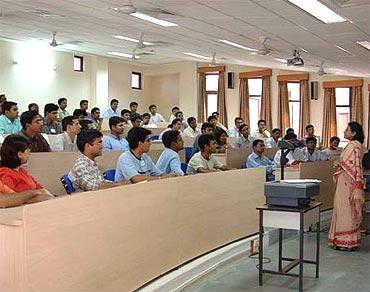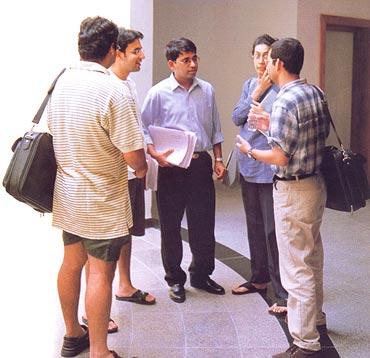Photographs: http://www.iimidr.ac.in Amit Bansal, PurpleLeap.com
India is one of the fastest growing economy in the world and is all geared to become one of the top three economies by the turn of this decade. A by-product of such incredible economic growth is the employment opportunities across the board. The demand for management professionals is no exception to this trend.
Due to this surge in demand for management professionals, Corporate India is facing a problem of supply of quality talent that can undertake the management jobs across functions.
One would assume that this huge management talent gap is a real boon for the institutions imparting management educations. However, the statistics of admissions in the year 2010 tell a different story.
In the year 2010, over 20 per cent of MBA seats went vacant with some states like Karnataka witnessing over 30 per cent empty seats. However, the number of students who appear for GMAT and CAT continues to rise.
The total number of students who have written various state and national admission tests for MBA colleges is estimated to be over 500,000.
To sum up, there is a huge demand for management professionals. The student interest in management education also continues to rise. However, institutions imparting management education are struggling to fill-in their seats.
The author is a Career Counselor and trainer who heads PurpleLeap, a Pearson Educomp company, that works with colleges to make students employment-ready.
Rethinking MBA education in India
Image: Image used only for representational purposesPhotographs: Rediff Archives
Where is the catch?
PurpleLeap conducted a survey on a sample of MBA aspirants who appeared for CAT or state MBA exams but did not take admission in any MBA college in 2010. These students were asked questions pertaining to the reason for not taking admissions and their future plans. Here are some key analyses from the survey:
- 83 per cent of the sample cited bad quality of education in most of the colleges as the reason for not taking admission. 12 per cent of the students cited the reason of 'High Fees' for not taking admission.
- 87 per cent of the aspirants felt that students from such colleges do not get 'MBA Type' jobs. They felt that the kind of jobs that the students are getting after the MBA from such colleges, are available to graduate students as well. The MBA degree from such colleges does not give any advantage in getting a better job.
- Over 90 per cent of such MBA aspirants will try for overseas MBA or will try for a 'Good MBA College' next year.
Rethinking MBA education in India
Image: Image used only for representational purposesPhotographs: Sahil Salvi
Let us understand the corporate perspective on the fresh management talent in the country. The corporate needs management talent to cope with the dynamic environment that economic growth brings with itself. The products are becoming more complex, the marketplace more competitive, and the customer more demanding.
Organisations change real-time to take advantage of opportunities. It means that the management professionals who operate in this environment need to be high on competence. While there are over 150,000 management graduate students who pass out every year, organisations are struggling to get quality talent that can operate in this environment of high growth. This is true even for the management graduates who are getting hired by these organisations.
The key issues highlighted by the corporates as regards fresh management talent coming out of colleges can be classified under the following categories.
1. Expectation mismatch
MBA education in India lacks in rooting the MBA graduate in reality. After reading case studies on brand extensions and mergers, MBA students develop an ivory tower image that is incapable of dealing with reality. This student goes through a curriculum that deals with strategic cases, most of them write from the point of view of a VP... the 20,000 feet perspective.
On the contrary, when the person joins the company, say as an area manager in an FMCG company, the person is expected to undertake a series of very different tasks.Rethinking MBA education in India
Image: Image used only for representational purposesPhotographs: Rick Wilking/Reuters
These tasks range from managing dealers and distributors, negotiating with them for meeting sales targets, designing and implementing trade promotions to meet business objectives, launching new products in the region by conducting influence and channel meets, managing a team of sales representatives and operating the requisite MIS to manage the territory.
For the first 3-4 years of a senior management professional, the person will be doing just this. And, the irony is that the student has not been taught any of the finer points of the role requirements.
Further, this student has grown up through an Indian education system that fosters competition and a scarcity mentality. S/he has not learned to collaborate, to listen, to reflect and to work towards making things work.
The net result is that this student is substantially under-prepared for the role assigned to her/him.Rethinking MBA education in India
Image: Image used only for representational purposesPhotographs: Rediff Archives
One executive described this phenomenon in very apt words:
"The MBA education builds an expectation to play the role of a senior management that obviously will not happen. The skill-set required for the role they are assigned to play is missing with them. They end up like being dhobi ka kutta na ghar ka na ghat ka."
2. Lack of understanding of relevance and application
The corporate world believes business education needs to become more applicable and relevant.
One senior finance executive who interviewed MBA finance graduates for entry-level role observed: I was unable to get these B-School MBAs to explain key points in finance. Although they knew the critical words, they were at a loss to explain exactly what the words meant. They were not able to apply simple concepts of profit and loss in practical situations.
Often, B-Schools teach theory, and expect the student to learn the application from case studies. Graduate students are tempted to learn only exactly what they need to pass, and no more.
This leaves a very large gap in understanding of the relevance of what is being taught and how to apply these concepts in the real business environment.
Rethinking MBA education in India
Image: Illustration used only for representational purposes3. Analysis vs action
The corporates finds that students are often trained to analyse, but not to implement. Employers commonly complain that MBA graduates theorise well, but can't necessarily do the work. The students do not have an understanding of the "role, responsibilities and purpose of business." Students think about business as a subject and not as a discipline.
MBA is a 'action' course rather than a passive one. You can't teach a person to swim by imparting him wisdom in the classroom. But, if the person has gotten himself wet a few times in the swimming pool and splayed his legs and hands, s/he will be able to relate and understand the swimming methods taught.
There is a need or the students to be involved in the action of business than analysis of business.Rethinking MBA education in India
Image: Illustration used only for representational purposes4. Contextual business communication
While both faculty and business executives agree that MBA graduates must be able to think well and express their thoughts in writing and speech, most institutions treat the business concepts and communication skills as two separate subjects.
A senior executive had the following observation: The students knew how to present themselves in a discussion. Similarly, they may know the key business concepts as well. However, they had little or no knowledge of the applicable, functioning world of business. They often lack the right use of concepts while discussing ideas. They may be good in spoken English but lack the skill of 'contextual business communication'.
It is quite evident that business education in India is failing to deliver the goods. While there is a huge demand for quality management talent, both corporate India and academia India will suffer if adequate steps are not taken in time. I will discuss some of such steps in the next edition.
As a nation, we are one of the largest producers of management talent. Let's endeavour to ensure that we produce the quality that matches the quantity.







Comment
article